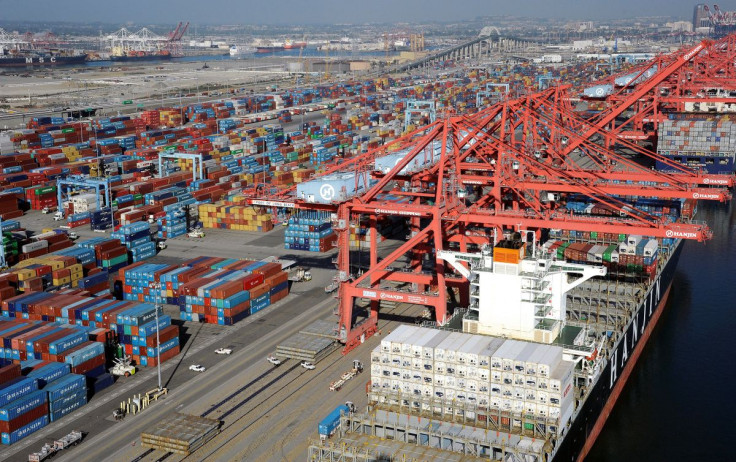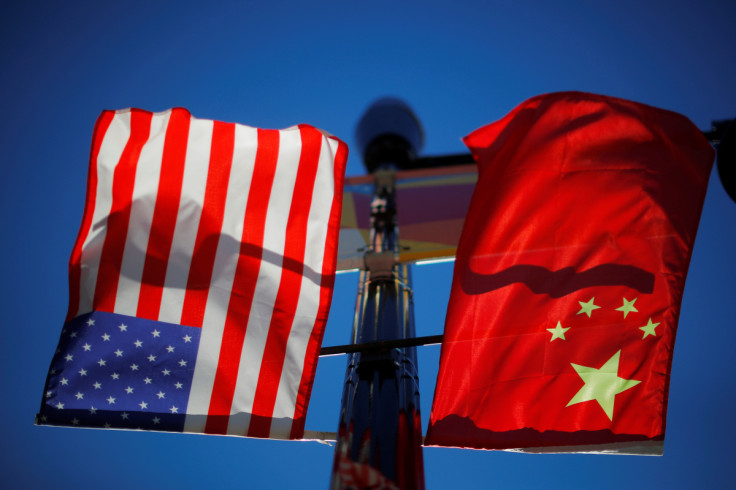US Concerned China-Made Cranes In American Ports Used To Spy On Military: Report

KEY POINTS
- U.S. officials called China-made ship-to-shore cranes at ports a trojan horse
- China-manufactured cranes in U.S. ports allegedly contain "sophisticated sensors"
- The FBI discovered intel-gathering equipment at a cargo ship containing Chinese cranes in 2021
U.S. defense and national security officials are raising the alarm about the possibility that the Chinese-made giant cargo cranes in American ports are being used for espionage.
Some U.S. officials see the China-made ship-to-shore cranes as a trojan horse, according to the Wall Street Journal.
The outlet noted that the inexpensive cranes, manufactured by Shanghai Zhenhua Heavy Industries Co. (ZPMC), allegedly contain "sophisticated sensors that can register and track the provenance and destination of containers," prompting fears that it could capture information about materials used by the U.S. military.
Bill Evanina, a former director of the National Counterintelligence and Security Center (NCSC), suggested that the Chinese cranes could be used to disrupt the flow of goods.
"Cranes can be the new Huawei," Evanina said.
"It's the perfect combination of legitimate business that can also masquerade as clandestine intelligence collection," he added.
The Chinese Embassy in Washington dismissed the alleged espionage through port cargo cranes, calling the U.S. officials' concerns "paranoia-driven."
The Chinese Embassy also warned that spying speculation could harm the U.S. interests and the economic ties between the two countries.
Despite China's denial that it uses locally-manufactured cranes to spy in U.S. ports, some federal agencies have already found evidence revealing Beijing's capability to gather intelligence using the heavy equipment.
In 2021, a classified assessment by the Defense Intelligence Agency (DIA) found that China could throttle port traffic or spy on military equipment shipped at U.S. ports.
"DIA's analytic efforts assist the U.S. military in anticipating and mitigating threats to global mobility, which relies in part on commercial transportation and shipping," DIA spokesman Lt. Col. Dean Carter said.
In the same year, the Federal Bureau of Investigation (FBI) searched a cargo ship containing ZPMC cranes at the Baltimore port. According to the people familiar with the matter, they found intelligence-gathering equipment on board.
The incidents prompted Congress to include a provision in last year's National Defense Authorization Act that requires the Maritime Administrator of the Department of Transportation to write an unclassified study on whether foreign-manufactured cranes could pose a risk to the country's national security.
Florida Republican Rep. Carlos Giménez introduced a bill last year to ban purchasing Chinese cranes due to spying concerns.
Giménez, a former mayor of Miami Dade Country, whose port is using ZPMC cranes, said he filed the legislation when he found that the software used in Chinese cranes could be used for heinous purposes.
However, the authorities are facing a tall order to determine whether all Chinese cranes in U.S. ports could have the intelligence-gathering capability, as ZPMC makes nearly 80% of the ship-to-shore cranes. The Chinese company also claims it makes up around 70% of the global crane market.
The latest U.S. accusation against China came after a suspected Chinese surveillance balloon hovered above the country's airspace for several days before getting shot down by a military aircraft in the sea off South Carolina.
The U.S.-China relations have been gravely affected by the incident, which led to Secretary of State Antony Blinken canceling his high-stakes visit to Beijing. It also pushed the North American Aerospace Defense Command (NORAD) to become more sensitive to all unidentified flying objects in the U.S. airspace.

© Copyright IBTimes 2024. All rights reserved.





















